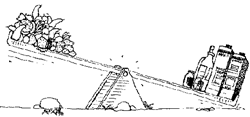Profit vs pollution
 THE discovery of the first chemical pesticide, dichloro diphenyl trichloroethane or ddt, is merely 60 years old. In this short history of chemical pesticides, most of the time the central point of discussion is the conflicting interests of producers and consumers. Undoubtedly, pesticides have helped increase agricultural production, which enable farmers to meet the demand for food of an ever-increasing world population. On the other hand, there is also a growing unease not only among consumers, but also among producers about agricultural and public health systems exposed to toxic pollutants. Politicians, scientists, environmentalists and non-governmental organisations are becoming more and more concerned about the hazards of pesticide pollution. Nobody knows whether there is an equilibrium between benefits and damages, between gains and losses in the appliance of pesticides.
THE discovery of the first chemical pesticide, dichloro diphenyl trichloroethane or ddt, is merely 60 years old. In this short history of chemical pesticides, most of the time the central point of discussion is the conflicting interests of producers and consumers. Undoubtedly, pesticides have helped increase agricultural production, which enable farmers to meet the demand for food of an ever-increasing world population. On the other hand, there is also a growing unease not only among consumers, but also among producers about agricultural and public health systems exposed to toxic pollutants. Politicians, scientists, environmentalists and non-governmental organisations are becoming more and more concerned about the hazards of pesticide pollution. Nobody knows whether there is an equilibrium between benefits and damages, between gains and losses in the appliance of pesticides.
Peter Hough's The Global Politics Of Pesticides is a thorough survey of these subjects with the aim of seeking clarity and a solution to the conflicting issues. Hough deals with all relevant and controversial themes, for instance, the use of pesticides for increasing crop yields and in controlling pest-transmitted diseases, environmental pollution, food contamination through the use of pesticides and its effect on humans. International trade in pesticides is also faced with a dilemma
Related Content
- Status report on behalf of Government of NCT of Delhi regarding regulation of borewells in Delhi, 15/04/2024
- 2023 world air quality report
- Turning off the tap: how the world can end plastic pollution and create a circular economy
- 2022 world air quality report
- 2021 world air quality report
- Order of the National Green Tribunal regarding water mafia in Rawatbhata, district Chittorgarh, Rajasthan, 28/10/2020
